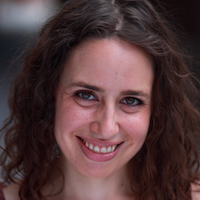
Today’s post is excerpted from How to Enjoy Being Edited: A Practical Guide for Nonfiction Authors by nonfiction writing coach and editor Hannah de Keijzer.
Hillary Weiss Presswood is a powerhouse brand strategist who projects confidence like a disco ball. But in the middle of writing her first book she asked me an important, not-so-sparkly question:
“Do you ever find yourself judging clients juuuust a teensy bit?”
Are you judging me?
I hear some version of this question often—most editors do—and I understand it completely. You’ve worked really hard. You generally like to be good at what you do. You certainly want to write a good book. And you’ve poured so much of yourself into your writing that sometimes your writing starts to feel like a part of you, so anyone criticizing your writing is criticizing you. That’s painful. It’s also not what’s happening in the author-editor relationship.
Here’s the distinction I like to draw. I’m never judging, but I am using judgment all the time.
Passing judgment—as in to “criticize or condemn someone from a position of assumed moral superiority” (thanks, Merriam-Webster)—has absolutely no place in editing. It honestly doesn’t occur to me. Not even a teensy bit.
But judgment is an essential part of an editor’s job in the sense of informed discernment, “the ability to make considered decisions or come to sensible conclusions” (thanks again, Merriam-Webster). Editors make judgments on every page of your writing, about your writing, so that we can draw out the best in it. I want your book to be clearer and more compelling after I edit it than it was when you passed it to me. Ideally, working with me will also help you level up your own writing and revision skills so you get better as a writer, project after project. My judgment works toward those ends.
But, as LeVar Burton used to say at the end of every Reading Rainbow episode, you don’t have to take my word for it. So what do other editors have to say?
Kendra Olson emphasizes learnable skill instead of bad or good: “An author I worked with on a developmental edit expressed concern that her writing might not be any good. I told her that I tend to view writing as being more or less skillful; in other words, writing is a muscle that can be strengthened. The author-editor relationship plays an important role in this.”
Jennifer Lawler, editor, editing teacher, and Resort Director at Club Ed editorial community, says: “As part of the editor-vetting process, get a feel for how a prospective editor talks about the authors they work with. If their Bluesky account is a constant stream of snark about authors, of course you’re going to feel judged if you have them edit your manuscript. But if you’re working with a good, well-trained editor, they’re going to be focused on helping you do the best work you can. They’re not thinking that you’re an idiot for misspelling your own name. Everyone occasionally makes mistakes, fails to see the broader perspective, and uses fifteen words where three will do. Your editor isn’t judging that, they’re just trying to help address it.”
Language editor Claire Cronshaw says, “If it’s the idea of accuracy that’s scaring you, don’t worry about it. Getting the accuracy right so the story can be enjoyed is where editors and proofreaders can help you. So bring your work to me without fear of embarrassment. I’m not judging you. An editor is not an examiner. An editor is not your teacher. Don’t let school day hang-ups get in the way of your success.”
How do I know when it’s time to let go?
Some writers can’t wait to pass their work to an editor so they can stop looking at the damn thing. Others tinker and tinker and tinker, convinced it’s never quite good enough; someone has to pry the manuscript out of their hands. Most folks are somewhere in the middle but wonder when it’s the right time to pass the work off for a boost. So how do you know when it’s time to stop working on your own—when it’s “ready”?
Here’s how you know it’s not ready: if you haven’t done at least one thorough, careful revision on your own, preferably more.
But it is ready if you think it’s as good as you can get it without help, and you want it to be better. It’s ready if you aren’t sure what to do next or even whether it’s making sense to other people. It’s ready if you think the next step is one in which you don’t have as much skill—like if you’re a big-picture thinker but you need help lining up all the little details to support that big picture. It’s ready if you feel you just can’t “see” it anymore. It’s definitely ready if you’ve started to worry that your revisions are actually making things worse or sucking the life out of your writing.
There’s a sneaky second question here: When are you ready to hand the manuscript off to an editor? If you’re having trouble separating yourself from the manuscript—you can see the document is ready to go but you’re not emotionally ready to let it go—take a deep breath. Why aren’t you ready? Would it help to reread the section on judgment above? Consider talking through the why of this with a friend or colleague whom you trust not to tease or shame you, but to listen, help you explore, and invite you to let go.
If you’ve put in the effort to find a professional editor you click with, I hope you will let yourself take the leap, trusting your editor to handle your work with respect and care. A good editor is rooting for your work and for you, doing their best to enliven your book and make you look great in the process. And communicate with your editor. Feeling nervous? Tell them. They may suggest a tweak to their working process, like a midway check-in, that will help set you at ease.
Will you rip the heart out of my book and make it sound like someone else?
I’ll tell it to you straight: there are some editors out there who are more concerned with their vision and voice than with yours. They might very well smother your book or tear its heart out. But the editor who will do that is, frankly, not good at their job. A good editor will speak up thoughtfully and straightforwardly when they think your preferences are holding your manuscript back, while honoring your style and making the best of your voice shine.
This is one reason why the initial emails and conversations with a potential editor, their testimonials, and the sample edit are so important. Do you like how the editor treats you? Treats your manuscript? How they ask questions and phrase their suggestions? If not, it’s OK to move on and find someone else who will take better care of your work.
Note from Jane: If you enjoyed this post, be sure to check out How to Enjoy Being Edited: A Practical Guide for Nonfiction Authors by Hannah de Keijzer.

Hannah de Keijzer is a writing catalyst, editor, and proofreader who helps authors create compelling nonfiction without grinding themselves to a pulp. Her book, How to Enjoy Being Edited: A Practical Guide for Nonfiction Authors, gives you everything you need to know to take full advantage of editorial partnerships. A former professional dancer and massage therapist, Hannah also specializes in helping clients use their workspaces and physical habits as creative fuel. Find her at hannahdk.com.


Hannah, this is a great post. I’m an author and a long-time writing instructor and developmental coach. One of the great disheartening events in my life are those two writers in any given year who just can’t bear to let go of their project and send it out. They will even admit to me that they can’t let go. They will enroll in class after class with any number of instructors or retreat leaders and tinker for years. They can’t let go. These are wise and wonderful people in their 50s and 70s and all ages. I’d love to hear from adult writers who were able to break free of that hold on them. Are there any writing how-to books out there about this syndrome? Books that might help writers accept how good they are and let go of the manuscript so that agents and editors and readers of any kind might look at it?
Thank you, Christine! I don’t know of books that tackle this specifically, but now I’ll be keeping an eye out. I’m curious if you’ve ever been able to sift through the layers of protection to help a writer discover why they feel that way. Knowing their individual whys might be a good place to start.
Excellent article, Hannah! Addresses many of the fears nonfiction authors often have about dealing with editors.
I love everything about this post, Hannah–your excellent insights, your tone, and most of all your approach to editing and to authors. I’ll be sharing this one with authors.
Thank you so much, Tiffany!
What is Bluesky?
https://en.wikipedia.org/wiki/Bluesky_(social_network)